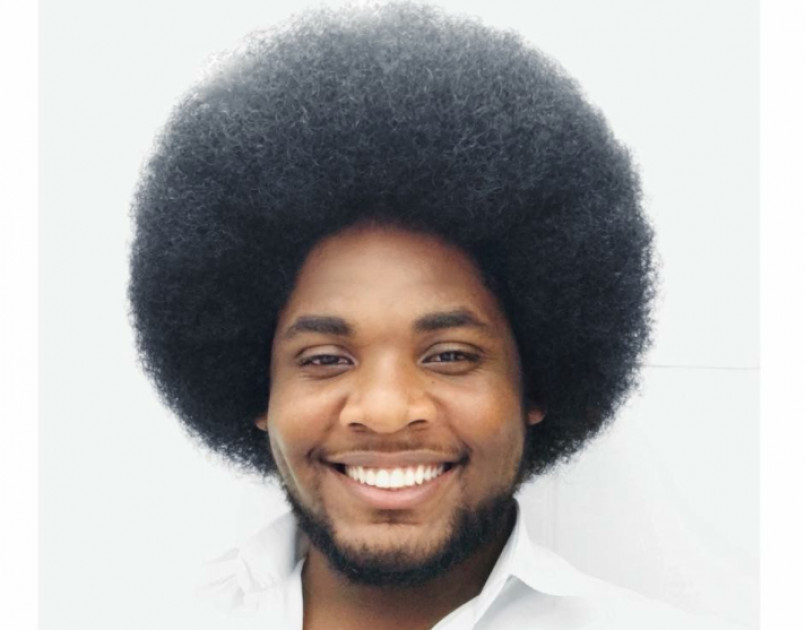Growing and grooming the male Afro: What you need to know

File image of a man sporting an Afro. PHOTO | COURTESY

Audio By Vocalize
‘No Shave November’ is over, but what
if you want to properly take your hair journey to the next level after dipping
your toes into it over the past month? At the risk of starting a war with Aaron
Rimbui and Bien Baraza’s 'Bald Man' army, here is what you need to know about growing and
keeping that afro in good condition:
African hair grows at an average of 1cm per
month, but because of its curl pattern, it is likely for someone to think
nothing is going on. After the 8-month mark, depending on how curly your hair
is or whether you started from a buzz-cut or a tapered fade, your hair begins
to get out of the ‘awkward stage’ everyone hates and can be picked into a
shapely small halo.
However, the major perk of being in the ‘awkward
stage’ is how seamless it is to take care of. Many guys can be obsessed with
attaining more length that they fail to enjoy this stage. Less tangling and as
such detangling is just a couple of picks and you are done. Your products last
longer because you are not using a lot. Quicker wash sessions. And the most
overlooked benefit: you can wear hats.
For starters, the much available information
on African hair products can seem overwhelming and unattainable. However, know
that you mainly need a good shampoo (free of sulfates and parabens, which strip
our naturally-dry hair even more drier), a deep conditioner to restore moisture in your hair after you have shampooed it, and a moisturizer or oil for
frequent moisture restoration. You can build on your product collection from
there depending on specific needs of your hair.
In this case, ‘washing’ refers to shampooing,
anything else is just hydrating your hair with water. It is highly recommended
that you do not wash your hair too frequently as it will strip your hair dry
and brittle, and your scalp will not retain the natural oils it produces. An average of once a week is enough shampooing for most people. Additionally, a micro-fiber towel or a cotton t-shirt is recommended to dry your hair after
washing, as regular towels tend to rip your hair off.
Because of the tight curls of Afro-textured
hair, combs with spaced out teeth are the best to use. Depending on how your
hair responds to it, you will know whether the combs you are comfortable with
are fine-toothed or wide-toothed. Although wide-toothed combs are considered ideal,
some tightly curled hair types co-operate with fine-toothed combs, provided the
teeth are spaced out.
While at it, be careful of parts of your head
where hair is delicate, such as the temples. For most men who keep their hair
free or in dreadlocks, the hair around the temple struggles with growing full
and they decide to get a taper fade altogether. But if you want a full afro,
you cannot afford to do that. Minimize manipulation on the delicate parts and
manipulate gently when you need to.
Because African hair tends to be dry and
loses moisture easily, covering it while you sleep is very essential so that
you do not lose all the moisture you have spent time infusing into it down your
pillow. Most pillowcases are made of cotton and cotton saps all the moisture,
making your hair prone to severe tangling and breakage. As such, it is
advisable to use a silk pillowcase or cover your head with a silk durag or wave
cap. As your hair gets longer, you might need to part it and do a few
chunky twists or tie it up to prevent matting overnight.
Vitamins B are regarded as the best for hair
growth, so add a bias to such foods as milk, eggs, meat and vegetables such as
spinach and kale. Drinking plenty of water is advised, too.
It is normal to shed hair daily but excessive
loss through either breakage or shedding can be detrimental to your progress.
Keep hair loss minimal at all costs; only comb your hair when it is properly
moisturized, and the biggest source of hair moisture is water.
Joining forums of people with African hair
who are on hair growth journeys tends to help a lot in exchanging notes and
tips. One also gets perspectives on products or practices from consumers who
have nothing to lose by being honest, compared to mainstream advertising or
social media influencers. The Reddit forum r/blackhair is an example.
The main point of it all, if we can summarize
this in one sentence, is; be patient, and let your mane do its thing and listen
to what your hair wants. It might sound very New Agey but, really, listen to what
it is telling you. Despite being Africans, everyone’s hair is different. If
something which purportedly works on African hair is not working on your hair,
your hair is not a problem; it is just different.


Leave a Comment